- Home
- Hammond Innes
The Lonely Skier Page 2
The Lonely Skier Read online
Page 2
I don’t know why he was in Shaftesbury Avenue that morning. It was just one of those things that happen. Sometimes Fate puts on a kindly mask and shakes up the pieces so that the right ones meet at the right moment. This was one of those occasions.
They say that things always work out for the best. But people who make that statement are always lapped in smug security at the time. I agree that life is cumulative and that the threads of each defined period of a man’s life are woven into the pattern. But it is not always possible to pick up the right thread just at the moment when you need it most. And I was feeling pretty desperate when I met Engles.
Before the war I had had a nice little family business—a local paper in Wiltshire. But that went under and when I had been overseas three years and became due for release, I found I had no job to go back to. I was longing to get back to Peggy and the kid, but we agreed there was nothing for it but to sign on for another year. Then a friend of mine suggested starting up a publishing business in Exeter. He asked me to join him in the venture. When I came out we put all we had into it. It lasted six months—the paper shortage and lack of capital were too much for us.
I wrote to everyone I knew—people I had known before the war and contacts I had made in the Army. I combed the ‘Situations Vacant’ columns of the papers. But there were too many of us in the same boat. I sent Peggy and Michael back to our cottage in Wiltshire and here I was in London in search of a job.
It was five years since I had seen London, and in the meantime I had been halfway round the world. I had run big towns in Italy and Austria. I had lived in the best hotels in Europe. I had had servants and transport. And that morning I stood in the rain in Piccadilly Circus, an unimportant molecule in the great flood of London, feeling alone and a little lost. I was excited and at the same time depressed. Excited, because London is an exciting place. From Westminster to the City you can climb dingy stairs to offices whose ramifications cover the entire living globe. Anything is possible in London. The whole world seems to be under your hand. If you have the right contact and are the right man for the job, London holds the key to every country in the world. But I was also depressed, for there is no city in which you can feel so small and lonely and lost as London, especially if you have no job.
But because I needed some toothpaste as well as a job, I strolled up Shaftesbury Avenue and walked into the first chemist’s I saw. And there was Engles.
I had been his Battery Captain back in 1942. We had gone overseas together. But after Alamein, he had transferred to the Intelligence and I had taken the Battery into Italy and had finished up as a Town Major. He had been an exacting Battery Commander. He had broken my two predecessors and everyone had said that I wouldn’t last six weeks. But I had. I had even enjoyed working with him. He had been brilliant, moody and erratic. But he had an exciting personality and terrific drive and energy when things were difficult. Now he was back in films and, according to the papers, his directing of K. M. Studios’ latest production, The Three Tombstones, had put him right at the top.
He nodded casually at my greeting, put the empty beaker down on the counter and looked hard at me for a moment as I made my purchase.
‘What are you doing now, Neil?’ he asked at length. He had a quick abrupt way of speaking as though his tongue worked too slowly for his mind.
‘I haven’t been back very long,’ I told him. I had heard him sneer at failure too often to let him know the truth.
‘Demobilised?’
‘Yes.’
‘You’ve been in a long time, haven’t you?’
‘Yes. I signed on for an extra year.’
‘A good-time Charlie, eh?’ he jeered.
‘I don’t get you,’ I said. But I knew what he meant. Living conditions had been pretty good at the end—much better than at home.
He gave a harsh laugh. ‘You know very well what I mean. All the bright boys were getting out when I left nearly eighteen months ago. The only ones staying on, apart from the regulars, were the duds and the adventurers—and the good-time Charlies. That’s what is wrong with our European administration. There’s no real future in the job, so it doesn’t appeal to the sort of men we ought to have out there. Well, which category do you put yourself in?’
‘Of the three categories you mention,’ I replied, ‘I think I’d prefer to be classed among the adventurers.’ My voice sounded sullen. I couldn’t help it. I was angry. I wasn’t going to tell him how I had hated signing on for that extra year, when I had seen so little of Peggy since we had been married and had barely seen the kid since he had been born. And I felt uncomfortable, too. In the old days I had managed to stand up to Engles; not because my personality was as strong as his, but because I knew my job. But to face up to his volatile and domineering personality now, when things were going badly, was too much. I wanted to rush out of that shop before he pried too deeply into my circumstances.
‘And now you’re back,’ he said. ‘Still running that tupenny ha’penny little rag down in Wiltshire?’
‘No, that went smash,’ I told him.
His dark eyes were watching me closely. ‘Then what are you doing now?’
‘I started a small publishing house with a friend,’ I replied. ‘What about you—are you working on another film now?’
But he wasn’t to be put off so easily. ‘It needs a lot of money to start up in publishing these days,’ he said, still watching me. ‘A whole crop of them sprang up like mushrooms soon after the war. They’re mostly in difficulties now.’ He hesitated. Then suddenly he gave me a queer puckish smile. He could be charming. He could turn it on like a tap. He could also be a cruel, sneering devil. But suddenly, there was the well-remembered smile and I felt a great relief as I realised that, despite his hangover, it was to be charm this morning. ‘I think you need a drink,’ he said. ‘I know I do after that filthy stuff.’ And he took my arm and led me out of the shop. As we crossed the road, he said, ‘Done any more writing, Neil? Those two one-act plays of yours I produced on the ship going out—they weren’t bad, you know.’
‘I wrote a play whilst I was in Austria,’ I told him. ‘But you know what the theatre has been like—nothing but musicals and revivals. Even established playwrights can’t get a theatre. And anyway, I doubt if it was good enough.’
‘You sound as miserable as hell,’ he said. ‘Life is fun. Don’t take it so seriously. Something always turns up at the last moment. Do you want a job?’
I stopped then. I could have hit him. His unfailing instinct for a man’s weakness had told him I hadn’t got a job and he was going to enjoy my discomfort. He was ruthless, unscrupulous. How he hated failure! How he revelled in attacking any man at his weakest point! It was incredible how that Welsh intuition of his smelled out a man’s weakness. ‘Life may be fun,’ I said angrily. ‘But it isn’t as funny as all that.’
‘Come on to the pavement,’ he said. ‘It’s a lot safer. So you think I’m not serious?’
‘I think you’re behaving stupidly,’ I snapped back at him. I was goaded by the thought that I had worked with this man on terms of equality and now he was in a position to cast me crumbs for the amusement of watching my reactions.
He took my arm in a firm grip and steered me through the glass door of a long gin palace of a saloon bar. He ordered whiskies. ‘Here’s fun!’ he said, and raised his glass mockingly at me. He was laughing. It showed in his eyes. ‘You think I’m not serious, eh?’ he said. ‘I am, you know—quite serious. Do you want a job or not?’
I downed my whisky at a gulp and ordered another round. ‘I don’t want your charity or your sneers,’ I said. I was feeling very bitter.
‘My God! You’re prickly,’ he said. ‘But then you always were. Did you ever know me charitable? I seem to remember you telling me—more than once—that I was the most ruthless person you had ever met. Just because I wouldn’t stand incompetence. It’s a strange thing, but just at the moment I can’t think of any one I would rather have run into. But li
fe’s like that. If you want a job done, the right man always turns up at the last minute. There are only about a half-dozen men I met in the Army who would be right for a job I have in mind. And if they’d all applied for it in a bunch, I’d have picked on you without a moment’s hesitation.’ The build-up was obvious. But I began to be interested. Engles never bothered to build any one up unless he really wanted to make use of them. He gave me a sudden warm smile. ‘You know—I’m quite serious, Neil. If you want a job, I’d be glad to have you work with me again.’
‘What sort of a job is it?’ I asked.
‘Three months at Cortina in the Dolomites as a script writer for K. M. Studios,’ he replied quickly. ‘A hundred pounds a month and all expenses.’
I gasped. It was the chance of a lifetime and I had walked bang into it in a chemist’s shop. But why me? ‘What makes you think I can produce the sort of script you want?’ I asked him.
‘I don’t want you to produce a script. I’ve got one already.’
‘Then what in the world do you want me to do?’
He reacted immediately to my disappointment. He patted my shoulder. ‘Three months in the finest ski-ing country in Europe isn’t a bad offer,’ he said.
‘I know,’ I said hastily. ‘But I couldn’t help being disappointed. You offer me a job as a script writer, and then you say you don’t want a script. You know I always wanted to be a writer.’
‘I didn’t mean to disappoint you,’ he said. ‘Look, Neil. It’s best to be frank with you. I don’t think you could write the sort of film script I want. But if you do write one, I’ll promise you this—I’ll read it and if I can use it in preference to the one I’ve got, I will. That’s fair, eh?’
‘Very fair,’ I agreed. ‘Now, what do you really want me to do?’
‘You speak Italian, don’t you?’ he asked.
‘Enough to get around,’ I replied.
‘Good!’ He smiled. ‘Since you class yourself among the adventurers, you might find this quite amusing. On the other hand, it may be a complete wash-out. In which case you will have to be content with three months’ holiday in the Dolomites. It’s just a hunch I have about something. I can’t follow it up myself. I’m finishing off my next film. What I need is somebody I can trust to hold a watching brief for me and keep me informed—somebody with a sense of responsibility and plenty of initiative. You’re just the man.’
‘Thanks for the build-up,’ I said. I was becoming excited despite my previous disappointment. Engles’ excitement was always infectious.
He laughed. ‘That’s not a build-up. You just happen to possess those qualities. You can also write, and that gives me a pretext for sending you out. Now—do you want the job?’
‘Well, what is the job?’ I asked him.
‘For God’s sake, Neil!’ he cried. ‘Do you want it or don’t you?’
‘Of course I do,’ I replied. ‘I need a job badly. But naturally I want to know what the job is. How else can I tell whether I can do it?’
‘You should know me better,’ he said in a quieter tone. ‘I wouldn’t be offering you the job if I didn’t think you could do it. Now, are you going to take it or not?’
‘I’d like to,’ I said.
‘Fine!’ And he ordered another round before I was halfway through my own drink. ‘Just a final,’ he said, ‘whilst I tell you what I want you to do. Then I must dash or I’ll miss my train. Do you know Cortina?’
I shook my head. I knew of it, of course. We had taken it over as a leave centre for our troops at the end of the war.
‘Doesn’t matter,’ he went on. ‘I plan to do a film there. There’s not enough movement in modern films. Too much of the play about them. That’s why Westerns are so popular. The studios seem to think people go to the cinema to listen. They don’t. They go to watch. There’s a colossal market waiting for a fast-moving ski picture. Plenty of spills and thrills. The world has gone crazy about sport—artificial excitement to replace the excitement of war. But I’ve got to convince my Studios first. I’m sending a fat, sluggish ape called Joe Wesson, who happens to be a first-class cameraman, over to take some pictures that will convince K. M. Studios that I’m right. You’ll go with him to do the script. That’s just an excuse to get you the permit. I don’t give a damn whether you write a script or not, but you’d better try. Joe Wesson will expect it. To everyone else but me you’re there to write a script. You’ll be on the Studios’ pay-roll as a script writer. I’ll fix that.’
He lit a cigarette. ‘You’ll stay at a place called Col da Varda,’ he went on. ‘It’s about five miles north of Cortina. It’s little more than a rifugio, but it’s got bedrooms. I’ve booked accommodation for two already. You go up to the Passo Tre Croci and take a cable sleigh—slittovia, the Ityes call them—up to the hut. Make a pretence of writing and watch everyone who comes up there. Particularly, watch for this girl.’ He produced a photograph from his wallet and handed it to me.
It was a very faded and much-worn photograph of the head and undraped shoulders of a girl. It had been taken in Berlin and scrawled across the bottom was—‘Für Heinrich, mein liebling —Carla.’ ‘She’s Italian,’ he said. I could see that. She had dark hair and eyes and a wide full mouth. There was something very animal about that face and the eyes had a glittering hardness. It reminded me of some of the pictures of girls I had seen in the Vice Squad’s index of prostitutes shortly after the fall of Rome.
‘Understand, I don’t want you to do anything,’ Engles continued. ‘I just want you to keep your eyes open. I’m interested in the slittovia and the hut, the people who are staying there, regular visitors, anything unusual that happens. I’m not going to tell you anything about it. If you keep your eyes and ears open, you’ll probably come to know as much about the business as I do. But, I don’t want you to do anything. Send me a daily report. If there’s anything startling, cable me at the Studios. Send your reports Air Mail. Is all that clear?’
‘As mud,’ I said.
He grinned. ‘That’s about as clear as I wanted it to be. See my secretary tomorrow. She’ll fix everything for you.’ He glanced at his watch and drained his drink. ‘I’ll just make it,’ he said. ‘It’ll be a three months’ engagement and, if my hunch turns out right, you might find yourself nicely set up. At worst you might produce a script I could use. You leave for Cortina the day after tomorrow.’
With that he clapped me on the back and hurried out, leaving me slightly bewildered, but feeling suddenly that the world was an exciting place and life worth living again. Here was a chance to write a film script handed me on a platter. I had several more drinks at that bar, savouring the excitement of the moment with the warmth of the whisky. If I wrote a script—and it were good enough—Engles, I knew, would keep his word. I did not spare much thought for the private assignment he had given me. I did not know then that it was to oust from my mind any thought of writing a script until I wrote of the actual events that occurred at Col da Varda.
When I got back to the cottage that night Peggy met me at the door and she saw at once that our luck had turned. Her face lit up. We laughed together over the strangeness of it all and went out to celebrate, spending money without thought for the first time in months, planning the script I should write. The fact that we were to be separated again didn’t seem to matter. It was for a short time and we were people with a future if we could grasp hold of it.
So it was that, two days later, I found myself sharing a carriage with Joe Wesson. Engles’ description of him as ‘a fat, sluggish ape’ was cruel, but not inappropriate. He had heavy features. The skin below the sockets of his eyes was dragged down by great pouches. His cheeks swept in ample folds to his splendid chins and flapped like dewlaps as he talked. He weighed, I should guess, over fifteen stone. He was, in fact, one of the most impressive figures I have ever seen and to watch him fitting himself into his sleeping berth was as good as a visit to the panda’s cage at the London Zoo.
He was in a furious temper wh
en he joined me on the platform at Victoria. He had a hangover and obviously hated travel. ‘You’re Neil Blair, are you?’ he said. He was panting, but for all that he was quick enough on his feet. ‘I’m Joe Wesson. We’ve been had for a couple of mugs, blast Engles’ God-damned soul! Why couldn’t he convince the Studios himself without sending us to shiver on a Dolomite, taking pictures and writing scripts?’ He heaved his gear on to the rack. ‘The Studios will do what he says anyway. He could just as well talk them into it. He’s got a tongue, and ’tisn’t as though it’s rusty. But he must have the whole circus running around full of the same idea.’ He fitted himself into a corner seat facing the engine and, as though to bear out Engles’ theories, brought out a stack of Westerns, picked up the top one and settled himself to read.
He worked his way steadily down through that pile of Westerns as we crossed the Channel and the train rattled across France and through Switzerland—that is, when he wasn’t taking on food or drink, both of which he did noisily and in large quan-tities, or when he wasn’t sleeping, which he did even more noisily, snoring with a strange series of grunts that ended in a slight long-drawn-out whistle.
He didn’t talk much. But once he leaned across in a friendly way and said, ‘New to the K.M. set-up, aren’t you, old man?’ He had a queer way of jerking his sentences out as though he were always short of breath. When I told him I was, he shook his head so that his cheeks quivered. ‘Good firm when you’re on top, but God help you when you’re not. They’re a hard lot. Can’t afford to make a mistake with them. If you do—’ he snapped his fingers expressively—‘you’re finished. Engles is their big man at the moment. He may last one year. He may last five. Worked with him before?’
I told him what my previous association with Engles was. ‘Ah!’ he said. ‘Then you probably know him better than I do. Get to know men when you live with them like that. He can be charming. And then again he can be a devil. Most ruthless director I ever worked with. If a star doesn’t toe the line, they’re out—he’ll get a new star or make one. That’s how Lyn Barin jumped to fame in The Three Tombstones. The original star was Betty Carew. She threw a fit of temperament—wanted scenes played her own way. Engles chucked her off the set. His language was a poem in technicolour. Next day he had the Barin girl there. No one had ever heard of her. And he made her a star right there on the set. He got the acting he wanted and the film was the better for it. Betty Carew had done good work for K.M. But she’s washed up now.’ He heaved a sigh. ‘Why you blokes ever come out of the Army, God knows! You’re safe there. Nobody can throw you out unless you do something stupid.’ Then he suddenly smiled. His smile was quite delightful. His face, for all its loose flesh, was strangely expressive. ‘Still, I admit I wouldn’t change places with ’em. Life’s a fight anyway. There’s no fun in knowing you’re safe whether your work is good or bad.’ And he returned with a deep sigh of contentment to his Westerns.

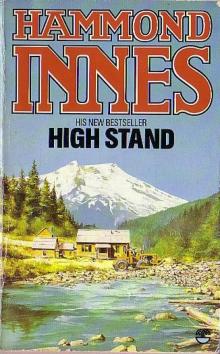 High Stand
High Stand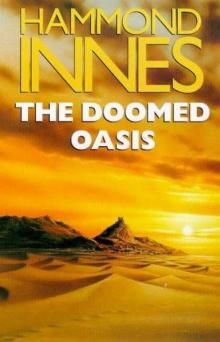 The Doomed Oasis
The Doomed Oasis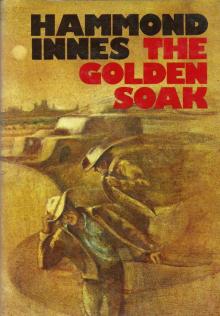 Golden Soak
Golden Soak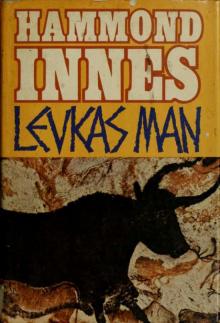 Levkas Man (Mystery)
Levkas Man (Mystery)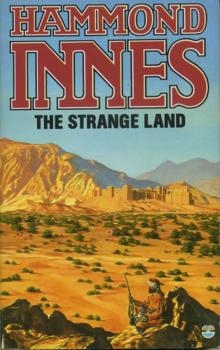 The Strange Land
The Strange Land Dead and Alive
Dead and Alive Attack Alarm
Attack Alarm The Strode Venturer
The Strode Venturer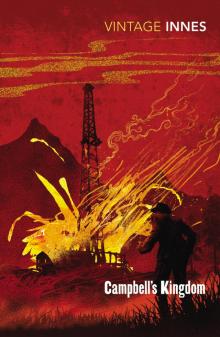 Campbell's Kingdom
Campbell's Kingdom North Star
North Star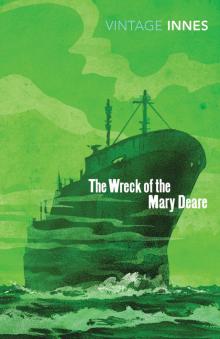 The Wreck of the Mary Deare
The Wreck of the Mary Deare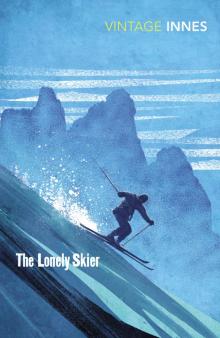 The Lonely Skier
The Lonely Skier The Black Tide
The Black Tide The Trojan Horse
The Trojan Horse Medusa
Medusa Air Bridge
Air Bridge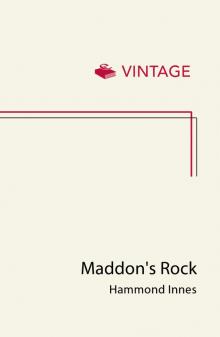 Maddon's Rock
Maddon's Rock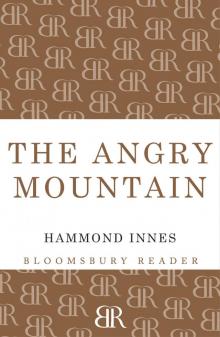 The Angry Mountain
The Angry Mountain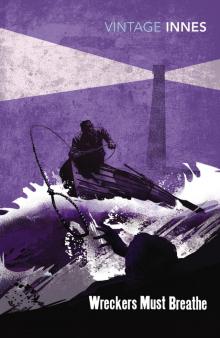 Wreckers Must Breathe
Wreckers Must Breathe Solomons Seal
Solomons Seal The White South
The White South